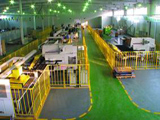
Northeast China's Heilongjiang Province is suffering from a brain drain, losing more than 200,000 highly skilled workers over the last two decades, according to sources with the provincial Personnel Department.
The workers, including engineers, have moved to more developed coastal regions or abroad.
More than 30,000 students graduate annually in the province, but one out of every six chooses to work in more prosperous southern cities.
In addition, only one-third of college graduates who leave the province to study return home, according to figures covering the last two years.
"The severe brain drain is one reason why Heilongjiang lags behind more developed coastal regions," said Duan Yuying, director of the provincial Personnel Department.
"What's more, key technical workers, engineers and creative intellectuals account for the main body of people leaving," he added.
A poor human resource structure is a continual problem in the province, he said.
"The lack of high-tech personnel directly leads to problems in research and development, ultimately resulting in an inferior position for Heilongjiang in the fierce competition from both home and abroad," said Bao Bingwen, director of the provincial Human Resources Center.
Personnel departments from Shanghai, Jiangsu and Zhejiang in the Yangtze River Delta area, and northeast China's Liaoning, Jilin and Heilongjiang provinces now co-operate in human resources exchanges.
The six parties signed a deal on Sunday in Harbin and vowed to push for an exchange of human resources information on an equal and reciprocal basis.
Li Zhanshu, vice-governor of Heilongjiang Province, said the co-operation between the "Northeast tiger" and the "Yangtze dragon" is a win-win strategy.
"As one of the most vibrant regions in China, the Yangtze River Delta area sets a good example in cultivation, use and management of talented people," Li said
"The co-operation will definitely create a benign mechanism for the orderly flow and better use of talented people," he said.
As China's old industrial base, northeast China has a large number of technicians in heavy industry, such as metallurgy and manufacturing, while the Yangtze River Delta possesses more high-tech personnel and is strong in research and development.
Meanwhile, officials in Xi'an, capital of northwest China's Shaanxi Province, are also racking their brains on how to draw more talented people to the city to boost its economy.
"We want to introduce high-caliber and badly needed professionals who are experienced in international marketing and familiar with the rules of world trade. We are also in need of people who can master key technology and who know about the capital market and technological management and services," said Sun Qingyun, mayor of Xi'an.
The local government will create a preferential environment for talented people to set up their own businesses, the mayor said.
With the opening and reform policies implemented in the past 20 years, especially with the five-year West Development Plan designed by the central government, Xi'an has witnessed rapid economic growth with investment and enterprises flowing into the city, Sun said.
"In Xi'an High-tech Industry Development Zone alone, the largest of its kind in northwest China and one of the best State-level development zones in the country, there are on average 3.7 new enterprises being established per day," said Jing Junhai, director of the administrative committee of the zone.
With the zone's rapid development, more and more enterprises, including some of the world's top 500 enterprises, have settled in the zone, which, in turn, creates needs for more high-level professionals, said Jing.
In order to attract more talented people to the city, the local government has issued a number of preferential policies and the zone also promises better conditions, service and funds for returned professionals from overseas to start their businesses in the zone, Jing said.
(China Daily March 22, 2005)
|

